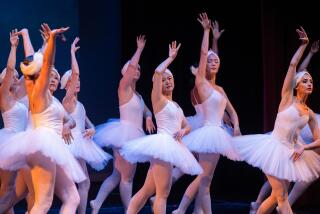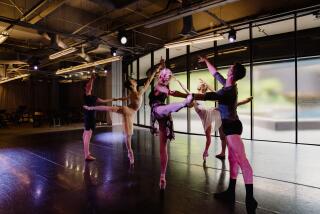DANCE REVIEW : Nureyev in ‘Giselle’ on His 50th Birthday
- Share via
Great danseurs don’t tend to age well. By the time they reach respectable, mellow, enlightened middle age, they usually have changed their stage-life styles drastically. The mind may still be eager, but the body isn’t willing.
The handsome prince, likely as not, turns into the witch or the villain, if he still treads the boards at all. And if character parts seem unseemly, there always is the functional alternative of teaching or coaching.
Rudolf Nureyev has never behaved like his colleagues. All through his flamboyant career, he has established--and broken--his own rules.
Thursday night at Shrine Auditorium, he celebrated his 50th birthday by dancing Albrecht in “Giselle,” as a guest with American Ballet Theatre. He danced carefully, nostalgically, and sometimes convincingly.
It would be foolish, even dishonest, to pretend that time has taken no toll on Nureyev’s legendary skills. There are some things he shouldn’t do anymore, and others that he cannot.
His once-staggering elevation has become a modest, effortful thing. His bravura prowess is now muted. But his familiar mannerisms--the gaping mouth, the expressive mugging, the florid gesture, the aura of self-absorption--all have retained their impact if not their focus.
In some ways, a Nureyev performance today casts a sad shadow on a unique career. In other ways, the current performances serve as a welcome reminder of the not-so-distant days when dancers commanded blazing personalities to match, and justify, their generous egos.
In Act I, Nureyev looked terrific, even if he tired easily. He paid reasonable attention to his Giselle, the lovely Marianna Tcherkassky, and attempted no challenge that he could not master with a semblance of dignity.
His only dubious indulgence involved the flailing of his own ridiculous, vast, luxurious, extra-long, giant-size cape during his famous running exit. Although the maneuver seemed as picturesque as ever, it drew attention, and sympathy, from poor Giselle’s still-warm corpse.
Nureyev played the second act
essentially as a desperate man lost in a trance. He may have sensed the presence of Giselle and the other wilis, but he never made eye contact. The approach carried a certain dramatic logic. At the same time, it minimized emotional rapport in the great pas de deux.
In the would-be virtuosic trials, Nureyev seemed even more strained than the libretto would warrant. Under the circumstances, one was grateful that he erred on the side of simplification.
Even when adversity threatened, one had to admire his bravery, his ambition, his style, his commitment and his entrechats. The audience gave him a hero’s ovation, probably in tribute to what he was rather than what he is.
Otherwise, the evening offered ABT business as usual.
Tcherkassky repeated the intelligent, eminently sensitive, small-scale Giselle we have been applauding for years. Leslie Browne, less than ideally cast as Myrtha, conveyed plenty of icy regality but lacked power, not to mention an imposing jump. Victor Barbee returned as an exceptionally strong and sympathetic Hilarion.
Kathleen Moore mimed Berthe’s warnings poignantly. Christine Dunham introduced a fascinating portrait of a particularly snobbish and petulant Bathilde. Julie Kent, the ingenue in Mikhail Baryshnikov’s most recent movie fiasco, served notice of a willowy talent as Myrtha’s first ghostly lieutenant.
The Baryshnikov staging, with additions and emendations by John Taras and Elena Tchernichova, remains something of a hodgepodge. Gianni Quaranta’s old-fashioned sets continue to look terminally quaint, but at least two odd touches have been eliminated: The mysterious, man-size entrance in the wilis’ tree has been sealed, and that silly revolving cross on Giselle’s grave has been stilled.
The corps tripped and traipsed neatly. The orchestra played Adam’s sweet old score scrappily for Jack Everly.
In San Francisco, incidentally, Baryshnikov came out of quasi-retirement to dance two much-lauded performances of Albrecht. For Los Angeles, he preferred to draft Nureyev, who happens to be 10 years his senior. One wonders why.
More to Read
The biggest entertainment stories
Get our big stories about Hollywood, film, television, music, arts, culture and more right in your inbox as soon as they publish.
You may occasionally receive promotional content from the Los Angeles Times.










